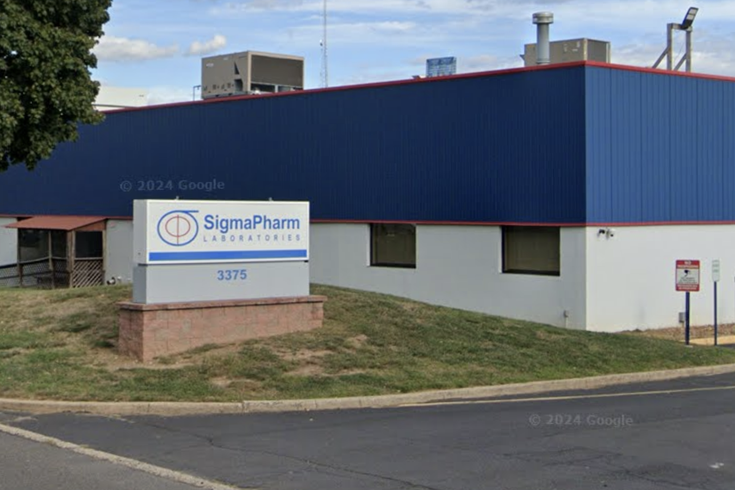
May 06, 2024
 Street View/Google Maps
Street View/Google Maps
Bensalem-based Sigmapharm Laboratories must pay $26.6 million to five scientists who formerly worked there and were fired in 2014. The company had accused the workers of stealing trade secrets.
Five scientists who formerly worked at a Bucks County pharmaceutical company have been awarded a record $26.6 million verdict in a countersuit against their former employer, Sigmapharm Laboratories. The CEO of the company fired the scientists a decade ago and then had sued them for $849 million, claiming they stole trade secrets.
The Bensalem-based company is a specialty maker of generic and branded drugs that treat a variety of conditions, from psoriasis to hepatitis B and thyroid disease. The lengthy legal saga reached a verdict in a jury trial last week, toppling the county's previous record of an $11 million award. The case was presided over by Judge Robert G. Mellon in the Court of Common Pleas.
The scientists in the lawsuit were recruited by Sigmapharm CEO Spiridon Spireas to join his new venture when he founded the company in 2005. One was hired as a direct report who would supervise the work of the other four, who had all previously studied under Spireas in graduate school.
"These people are all immigrants. They really (looked) up to him," attorney Gavin Lentz, who represented the four junior scientists, said Monday. "Spireas says to them, 'I'm going to start my own pharmaceutical company ... and if you quit your jobs and come work for me, I will give you equity (in Sigmapharm)."
Intrigued by the prospect, the scientists left their jobs and went to work for their mentor. Spireas lured each of them with offers of between 5-10% equity in the company and told them they would "become millionaires" once the business began to generate profits, the countersuit claimed.
But the initial terms Spireas offered the scientists were all based on an oral agreement. And about a year into their employment, the CEO required them to sign a new employee agreement in order to retain their jobs. They were each given non-voting shares in the company of between 1-4%, which would only vest fully after 20 years of employment. If they were fired for cause before that time, they would forfeit their stakes and the company could purchase them for $1.
"This was about trust and greed. A graduate professor is someone you look up to with honor," Lentz said. "They trusted him and he saw how much their small percentages were going to earn them and said, 'To hell with this,' and took it back."
The scientists worked at Sigmapharm for years under the premise that the promises they had been made would be upheld. All of them were praised for their work and received promotions during their time there, according to the suit.
Spireas claimed that Sigmapharm was losing money until 2012 and had only been surviving with his own funding. During that time, the company grew from a research and development firm to one that also manufactured drugs.
When the five scientists approached Spireas to renegotiate their contracts in 2014, the company was generating about $300 million in revenue and made a profit of about $25 million that year, according to the scientists' lawsuit. After efforts to strike a new deal broke down, the scientists were all fired.
Sigmapharm seized their work computers and email accounts, attempting to find evidence that they had stolen trade secrets that would help them transition to the next stages of their careers.
"They've been suing these people for 10 years, and when we actually tried the case, they came up with absolutely nothing to show for it," Lentz said. "Their suit against us was for ($849 million). The jury awarded them zero and awarded us ($26.6 million)."
Spireas and Sigmapharm had alleged that one of the scientists was improperly discussing a potential deal in India involving some of Sigmapharm's products, a function that had been part of his job at the company. Another scientist, originally from Nigeria, was working with another company to provide hepatitis B vaccines in his home country, which couldn't get them directly from Merck due to the company's wariness of scams. Sigmapharm accused the scientist of stealing information to facilitate this.
"We argued that since Sigmapharm does not sell vaccines and doesn't even have the capacity to make them, it wasn't competing," Lentz said. "The vaccine prevents you from getting hepatitis B. Sigmapharm's medication aids you if you have it. (The scientist) first tried to sell Sigmapharm's drug to Nigeria, but they said, 'We don't want to treat it. We want to end it.'"
The biggest strike against Sigmapharm's case was the lack of supporting evidence in the U.S. Food & Drug Administration's Orange Book, which maintains a list of medications and where they are developed.
"If you put the name of a drug in there, it immediately tells you who's working on it, where the company is and what stage they are," Lentz said. "Nobody is making any of the drugs the scientists were alleged to have stolen. All of their allegations were provably false by public information."
During the trial, the jury heard that Spireas had placed the scientists' withheld stock in a family trust in the course of the legal case. Jurors were also informed about the profits the company derived from formula work that the fired scientists had done.
Lentz said the five scientists suffered professional hardships as a result of the decade-long case after they lost their jobs at Sigmapharm.
"They have been under this cloud of alleged stealing trade secrets when they knew they didn't do it," he said. "This complaint has been a public record and when they tried to find jobs elsewhere, people would say, 'Well, you're embroiled in litigation' ... you're damaged goods.'"
By law in Pennsylvania, the $26.6 million award also includes 6% interest added for each of the 10 years since the time the scientists were fired, which Lentz said makes it worth about $28 million. He anticipates that Spireas will appeal the verdict, but doing so requires him to put up 120% of the damages awarded. The bulk of the damages are for breach of contract, along with a smaller figure for breach of fiduciary duty.
Spireas and Sigmapharm Laboratories did not respond to requests for comment.
Lentz said the record award amount is unusual for Bucks County, which has a reputation for more conservative sums. He said Spireas misjudged how the case would play out and didn't have the evidence needed to back up his contention that the scientists were fired for cause.
"He was trying to crush them and bankrupt them. He just didn't think that we would actually take this case to trial," Lentz said. "They just wanted to create a smokescreen that they had a basis to fire (the scientists), and then figured we would not be able to withstand the years of litigation."